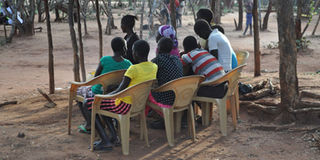West Pokot girls escape from homes for fear of FGM, forced marriages

A group of girls taking refuge at Wanyoi Primary School in Nakwijit location in Kapenguria Constituency, West Pokot County on November 30, 2016. PHOTO | DENNIS LUBANGA | NATION MEDIA GROUP
What you need to know:
- The FGM rates among the Samburu and Pokot, Maasai and Marakwet communities remain high despite the culture being criminalised in the country.
- The United Nations Population Fund and World Vision Kenya have been instrumental in the fight against FGM among pastoral Communities in the North Rift region.
- About 1000 parents in West Pokot declared their stand against FGM in a drive by the UNFPA, Anti-FGM Board and World Vision International.
Hundreds of girls have escaped from their homes in West Pokot County to avoid being subjected to female genital mutilation (FGM) and forced marriages, the Nation.co.ke has learnt.
The region records high cases of mass female circumcision and forced early marriages during the August and December school holidays.
Wanyoi Primary School head teacher Benjamin Lomeringole indicated that despite the existence of laws against the two exercises, its implementation in the region has been a challenge.
“Some of these girls who have escaped their homes are seeking refuge either in schools or rescue centres. Some of them have however crossed over to the neighbouring Eastern Uganda to stay with their relatives,” said Mr Lomeringole.
Wanyoi Primary School in Nakwijit location and Kapkata Progressive Primary School in Ptoyo location are some of the schools where the girls are seeking refuge.
The situation is the same at Kapkata Progressive Primary School where Ptoyo location chief Samuel Chemonorey and some area residents are watching over 42 girls who have run-awya from the cultural practice.
Hundreds of girls aged between 10 and 21 years are always subjected to FGM in the region.
“Over 80 per cent of girls either do not join school or drop out early after undergoing FGM, as girls are often married off immediately following the cut. This is the reason we protect them at whatever cost throughout the school holidays,” said Mr Lomeringole.
The FGM rates among the Samburu and Pokot, Maasai and Marakwet communities remain high despite the culture being criminalised in the country.
The United Nations Population Fund and World Vision Kenya have been instrumental in the fight against FGM among pastoral Communities in the North Rift region.
“There is great need to put these girls into isolation because the vice can have detrimental lifelong health consequences including chronic infections, severe pain during urination, menstruation, sexual intercourse and childbirth, infertility, and psychological trauma,” explained the school head.
When the Nation visited Wanyoi Primary School that is located Kapenguria Sub-County last week, most of the girls said that they were comfortable being at the school rather than being at home.

Wanyoi Primary School head teacher Benjamin Lomeringole during an interview with the Nation on November 30, 2016. The school is one of the places where girls who have escaped FGM are seeking shelter. PHOTO | DENNIS LUBANGA | NATION MEDIA GROUP
Purity* (not her real name) said that she had run away from her home to avoid being subjected to FGM indicating that the practice has severe consequences to the victims.
“I was told that when you undergo the cut you get to live with a permanent scar which is not a good thing. I believe I will get a husband even without being circumcised,” she said.
Another girl, Sharon*, lauded the United Nations Population Fund Agency (UNFPA) and World Vision Kenya which have been instrumental in the fight against FGM among pastoral Communities in the region.
“These NGOs have really helped us acquire education. They give us some little money to facilitate our education and this keeps us going,” she said.
UNFPA has donated Sh9.3 billion to reduce female genital mutilation to below 21 per cent —international rates — especially among pastoral communities in developing countries.
According to the UNPFPA executive director Dr Babatunde Osotimehin the funds will be utilised to combat harmful female circumcision practices among communities practicing the rite.
“Discrimination among women and girls remains passive in every society. It is one of our greatest obstacles to socio-economic development and the unaddressed needs are immense,” he said.
West Pokot Deputy Governor Titus Lotee said that the devolved unit has set aside about Sh9 million to construct rescue centres in the region where girls will be protected from the vice.
Anti-FGM Board chairperson Linah Kilimo called on law enforcement officers to act tough on individuals perpetuating female circumcision and instead encourage equal access to education.
About 1000 parents in West Pokot declared their stand against FGM in a drive by the UNFPA, Anti-FGM Board and World Vision International.





